Surface Selection
March 2024
When it comes to surfaces, these can make or break your new kitchen with many factors to consider in terms both look and functionality.
You have many choices for surfaces to meet the needs of the family, budget, and space. Material selection is becoming increasingly important for subtlety, colour, texture, practicality, and sometimes wow factor. Increasingly there are some other considerations impacting surface selection, including the alternatives to Engineered Stone.
Engineered stone, also known as reconstituted stone, has become a popular benchtop material. It is promoted as a durable, cost effective and aesthetically similar alternative to natural stone. So, why should alternatives be considered and what are the choices?
Engineered stone contains high levels of crystalline silica, which is a naturally occurring mineral found in many construction materials. This crystalline silica becomes airborne when products like engineered stone are cut and when the dust is inhaled the mineral makes its way deep into the respiratory system with life altering consequences. So, the best way we can minimise the risk to stone workers in the industry it is to choose the right brand of material for your benchtop.
We have developed a list of alternatives, in no particular order. Giving you some information on options for beautiful benchtops and splashbacks
Natural Stone
Natural stones, like granites, marble and quartzites contains a percentage of crystalline silica, although in significantly lower levels than that of engineered stone. Natural stone offers a stunning and authentic option, especially if a client wants something with a little drama, although it does tend to cost a little more. Being a natural product there can be great variability in the visual grain density of the stone so seeing the slabs is important as each one is unique in pattern.
Natural granites and marbles are highly desirable surface solutions as these unique natural stones are very beautiful and eye-catching. A beautifully veined stone can be very striking and work well in both modern and traditional kitchens, significantly impacting the overall look of the kitchen.
Granite and marble are still the most common types of stone for benchtops. Granite is superior for strength and durability, while ‘softer’ marble is typically the more expensive of the two. Because both are natural, they have variations in colour and texture. Each slab is unique, which adds a strong sense of authenticity to a kitchen, with different stones bringing their own aesthetic qualities and physical properties. Limestone, marble, granite, and quartzite get progressively more robust in that order. Most natural stones require regular resealing to maintain their appearance.
 Natural Stone examples: Patagonia Quartzite, Invisibile White Marble & Leathered Titanium Granite.
Natural Stone examples: Patagonia Quartzite, Invisibile White Marble & Leathered Titanium Granite.
Porcelain
Porcelain products like Dekton and Florim are widely used, the textures and sophisticated patterns replicating natural granites and marbles. Porcelain is an ultra-compact surface that is heat and fire resistant as well as highly scratch and UV resistant, making it the perfect choice for both indoor and outdoor kitchens. Porcelain benchtops contain around 15% quartz, the most common form of crystalline silica.
Made from all-natural compressed porcelain and available in large-format slabs, because it is so strong, it can be produced in thinner profiles than other materials, making it ideal for modern designs.
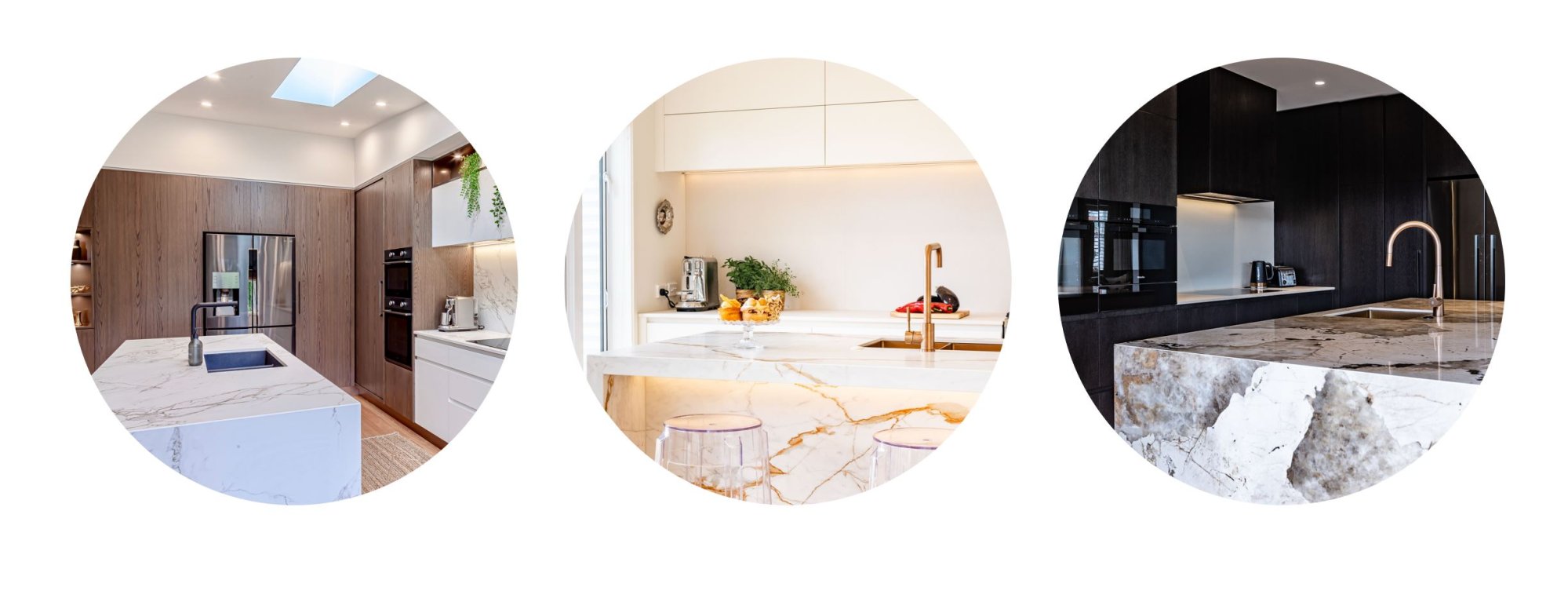 Porcelain examples: Dekton Entzo, Reverie & Khalo.
Porcelain examples: Dekton Entzo, Reverie & Khalo.
Stainless Steel
Stainless steel benchtops are durable and easy to clean and are most suited to an industrial aesthetic. The preferred choice in commercial kitchens due to its durability, excellent antibacterial properties, heat resistance, and ease of cleaning. Reasonably priced, stainless-steel benchtops are available in a range of different finishes — smooth, textured, patterned, etc., and is an excellent choice for hard-wearing family kitchens. Often stainless steel is used in the hard-working parts of the kitchen, such as sculleries and on cooktop surfaces. They can be prone to scratching and great care must be taken with abrasive products on the surface.
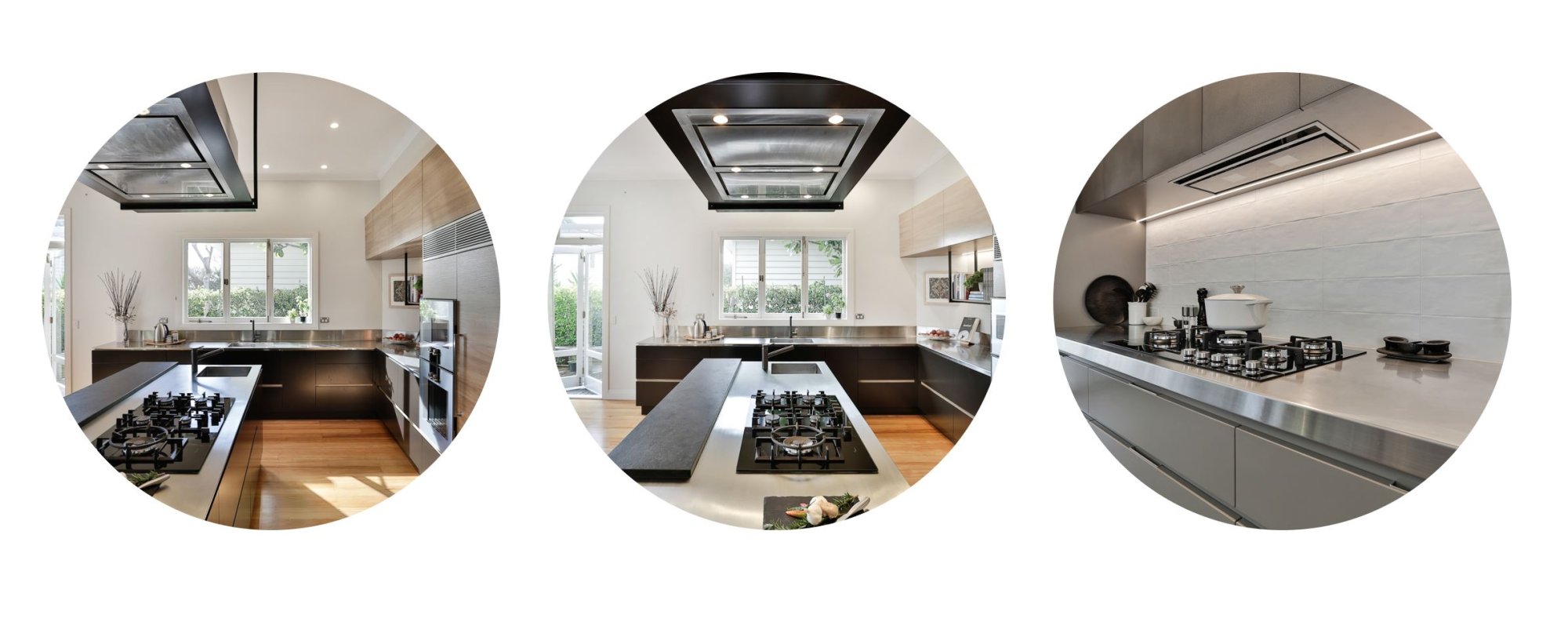
Solid Surface
Solid surface benchtops are crystalline silica free, made from bauxite and an acrylic resin binder. They are UV resistant, stain resistant, scratch resistant and repairable. Slabs can be joined together using a method that makes them completely seamless, including sinks and drainers. Available in many colourways, there is bound to be something to suit your aesthetic.
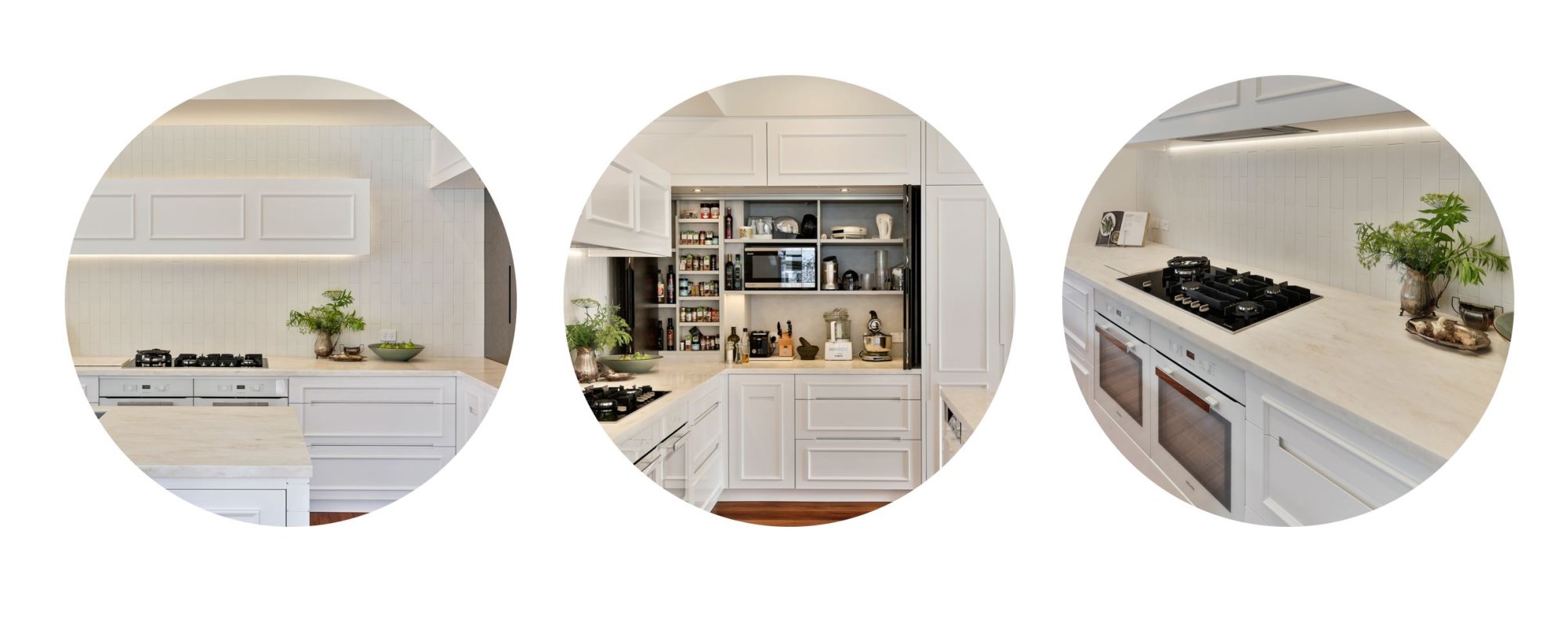
Solid Surface: Corian Witch Hazel
Timber
A timber benchtop adds warmth to your kitchen and is very popular for bathroom vanities or breakfast bar areas. With many timber species to choose from, you can select a colour and grain to suit your aesthetic. Timber is a softer finish to other materials, but it is easily refinished and resealed. The cost of timber benchtops varies depending on species, plank sizes and finish.
Mainly used in conjunction with more traditional kitchen designs and chosen by those who love its warm aesthetic and soft touch, timber is still a popular choice. Timber benchtops require regular resealing and are less resistant to scratches, dents, and staining; therefore, they need more care to keep them looking their best.
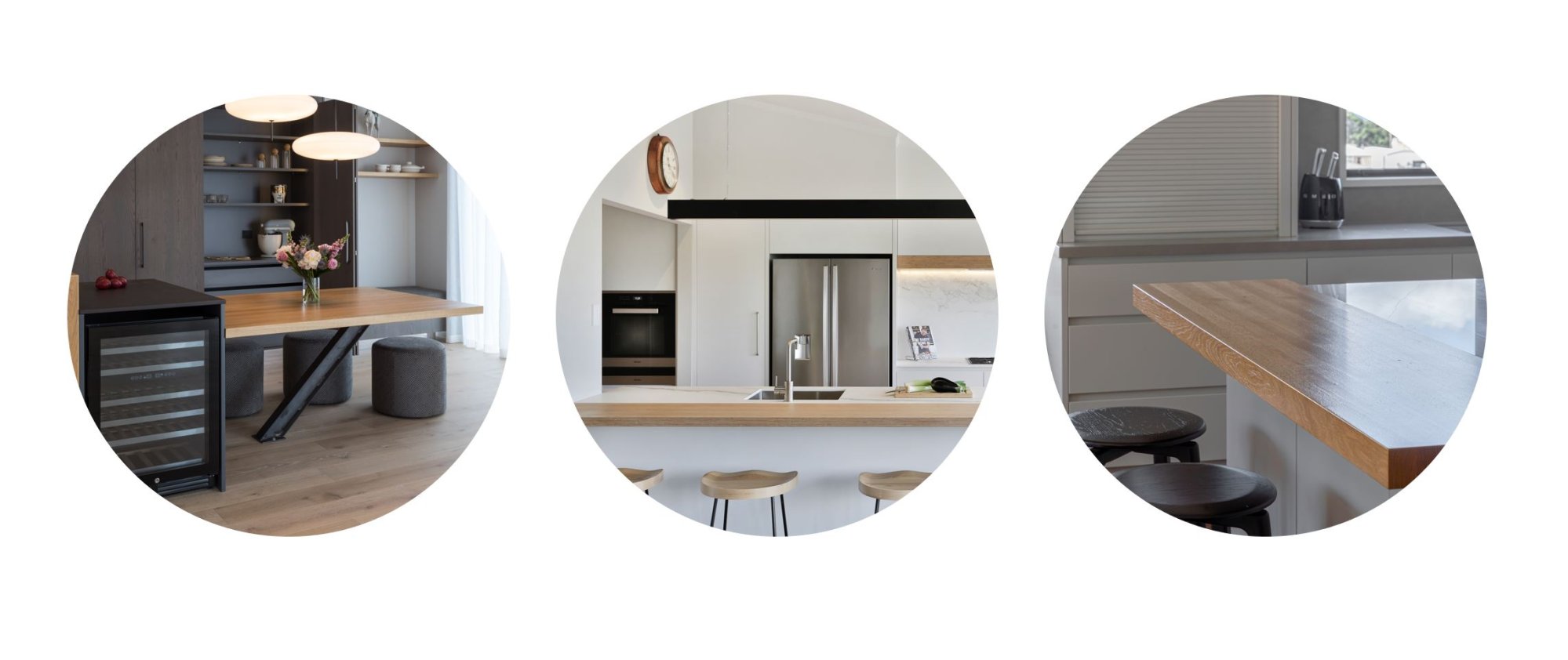
Timber: Solid Oak & Carbonised Bamboo
Concrete
A concrete benchtop or vanity top can really add something special to your kitchen or bathroom. It doesn’t need an industrial aesthetic to showcase a concrete benchtop. Concrete benchtops can be pre-cast offsite, be formed and poured in situ and some suppliers offer pre-cast vanity tops in a variety of colours. Concrete benchtops are hardwearing and heat resistant and can be created in a variety of colours and finishes.
Laminate
Laminate technology has come a long way over the last decade or so, don’t think of laminate as your parent’s old 1970’s orange and brown kitchen. There are over one hundred realistic prints, textures, and block colours to choose from, in many different finishes, including self-healing nano particle flat matte laminates like Fenix NTM shown below. Laminate is not going to be for everyone, but don’t rule it out.
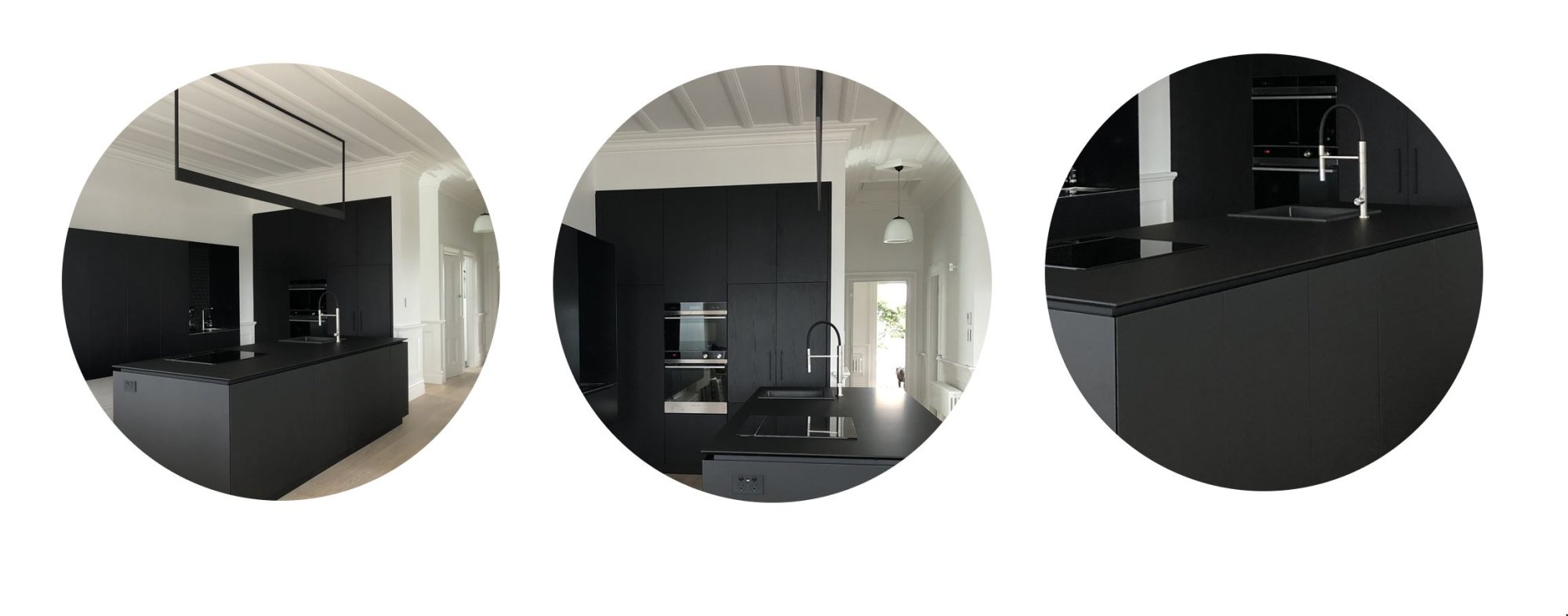
Laminate: Fenix NTM (nano-tech matte).
Looking into the future...
The addition of under-bench and in-bench technology, such as contactless phone charging, is already available in Europe, but as yet these have not really taken off in New Zealand. Built-in induction cooking surfaces are also available in Europe and are slowly taking off here, but extensive options could be a while off.
It's always a good idea to get expert advice on the pros and cons of a benchtop material you may be looking to use, so talk to our kitchen designers about which option is best for you.
